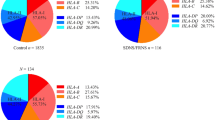Abstract
We investigated the major histocompatibility complex class I and II loci in three Bengali families with nine children affected with steroid-sensitive nephrotic syndrome (SSNS). A sequence-specific primer (SSP) of DNA typing method was used to detect human leukocyte antigens (HLA). The unaffected siblings and their parents were also studied. Similar to previous reports, there was a high frequency of HLA-DR7.1 (DRB1*0701), DR53 (DR B4*01011–0104) and DQ2 (DQB2*0201–3) antigens in the affected children. However, there was a similar finding in the unaffected children and their parents. HLA-DR7.1 probably was not a causative factor, since it had no predictive value for the occurrence or the severity of SSNS in the affected families. Siblings with identical HLA typing behaved differently (they either had or did not have SSNS). In these families there was no correlation between predisposition to the nephrotic syndrome and the genetic determinant responsible for HLA.
Similar content being viewed by others
Author information
Authors and Affiliations
Additional information
Received: 14 July 2000 / Revised: 15 November 2000 / Accepted: 15 November 2000
Rights and permissions
About this article
Cite this article
Kari, J., Sinnott, P., Khan, H. et al. Familial steroid-responsive nephrotic syndrome and HLA antigens in Bengali children. Pediatr Nephrol 16, 346–349 (2001). https://doi.org/10.1007/s004670000549
Issue Date:
DOI: https://doi.org/10.1007/s004670000549




